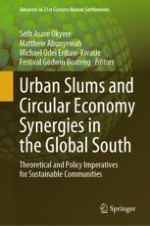This book takes a theoretical and empirical distance from urban slums/low-income settlements as a threat to environmental sustainability and recast them as places where environmentally rehabilitative and circular practices occur—drawing on the theoretical lens of the circular economy (CE). CE is defined as regenerative system that minimizes waste, emission, and energy leakage by slowing, closing, and narrowing material and energy loops. In principle, CE departs from the traditional linear model of take-make-use-dispose. As conceived in urban contexts, circular cities offer possibilities to regenerate natural systems, design out waste, and keep products in use. While the CE key principles of reduce, repair, and reuse are essential to the sustainable and inclusive interventions in urban slums, there is lack of case studies exploring the role of place and agency, especially the slum living-CE nexus in global south contexts. In inequitable urban transitions, a nuanced understanding of thesynergies between urban slums and the circular economy is not only theoretically relevant for reconceptualizing the slum in urban sustainability discourses but also exert policy and practice ramifications to decidedly figure out how the urban slum phenomenon can foster the sustainable and inclusive development of marginal areas through contextual and people-centered initiatives.
